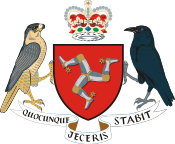Governor of the Isle of Man
Appearance
 |
|---|
The title of Governor of the Isle of Man existed until 1828. Other titles were also used, especially before 1595.[1]
- Holan (1219–?), titled Seneschal
- List incomplete
- Fogall McHascatt (1260–?), titled Seneschal
- Godfrey MacManus (1266–?), titled Bailiff
- Alan of Galloway, titled Bailiff
- Maurice Okerfair, titled Bailiff
- Reginald the Chaplain, titled Bailiff
- Brennus, titled Bailiff
- Donald, titled Bailiff
- Walter de Huntercombe (1290–93), titled Custodian
- List incomplete
The following were Governors of the Isle of Man:
- Sir Thomas Gerrard (1595–1596)
- Peter Legh (captain; 1596-?)
- John Ireland
- John Greenhalgh (1640–51)
- William Christian (1656–?)
- James Chaloner (1658–1660)[2]
- Thomas Fairfax, 3rd Lord Fairfax of Cameron (1660)[3]
- Thomas Cobbe?
- Isaac Barrow (1664–?)
- Nicholas Stanley (1696–1701)
- Charles Zedenno Stanley (1702–1703)
- Robert Mawdesley (1703–1713)
- Charles Zedenno Stanley (1713)
- Alexander Horne (1713–1723)
- John Lloyd (1723–1725)
- Thomas Horton (1725–1736)
- James Murray, 2nd Duke of Atholl (1736–1744)
- Patrick Lindsay (1744–1751)
- Basil Cochrane (1751–1761)
- John Wood (1761–1777)
- Edward Smith (1777–1793)
- John Murray, 4th Duke of Atholl (1793–1828)
References
[edit]- ^ "Governors and Deputy Governors to 1926" (PDF). www.tynwald.org.im. Retrieved 9 October 2021.
- ^ Publications of the Manx Society Volume 24 1877 "James Chaloner was appointed Governor in 1658, and continued so until 1660. Lord Fairfax held the Island until the Restoration, 28 May 1660. The death of Oliver Cromwell, on the 3d September 1658, was a great blow to the Commonwealth ..."
- ^ The concise encyclopedia of the revolutions and wars of England, ... Page 103 Stephen C. Manganiello – 2004 "In 1652, Parliament granted Lord Fairfax, his wife's cousin, the Isle of Man. On 17 August 1652, Chaloner was appointed one of the three commissioners to settle Fairfax's affairs on the island. Later, he wrote the Short Treatise of the... Wood says that in March or April, 1660, messengers were sent from the Superior Power to take James Chaloner into custody, and to secure his castle for the use of His Majesty; but he having received timely notice of their coming, dispatched away himself by poison"
